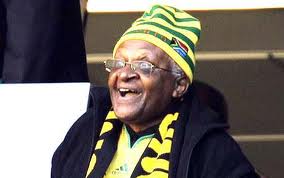Archbishop Emeritus Desmond Tutu has called for a “wealth tax” to be imposed on all white South Africans.
The former archbishop of Cape Town and former head of the Truth and Reconciliation Commission (TRC) also called on members of President Jacob Zuma’s cabinet to sell their “expensive cars”, “to show you care” about the poor in South Africa.
Tutu said apartheid had left South Africans riddled with “self-hate”, and it was directly to blame for the country’s vicious crime rate and road carnage.
He made the calls last night during a book launch at Stellenbosch University’s Institute for Advanced Study.
The book, The Humanist Imperative in South Africa, contains 26 essays by leading academics and public figures and is edited by Professor John de Gruchy.
As guest of honour, Tutu recounted the myriad ways apartheid had dehumanised South Africans.
“Apartheid damaged us all; not a single one of us has escaped.”
In a break from his prepared speech, Tutu said a “wealth tax” had been suggested during the TRC process, and had enjoyed support at the time.
Moments earlier, he had told the whites in the conference room: “You all benefited from apartheid. Your children went to fancy schools, you lived in posh suburbs.”
He stressed, however, that this did not mean all whites had supported apartheid.
Speaking to the Cape Argus after his speech, Tutu expanded on his wealth tax call.
“There were many in the white community who were ready for this (at the time of the TRC process).
“It could be quite piffling, maybe 1 percent of their stock exchange holdings. It’s nothing. But it could have helped... maybe building new homes, and that would have been an extraordinary symbol of their readiness.”
Asked whether he was again calling for a “wealth tax”, Tutu said: “That’s what I’m saying.”
He then laughed: “What were you doing in there (the conference centre)? Were you listening?”
Tutu did not say how he wished the tax to be implemented, but said he hoped whites themselves would “agitate” for it to be imposed upon them.
Throughout his speech, Tutu cited numerous examples of what he saw as apartheid’s impact, which had fundamentally been an “erosion of self-esteem” and the advent of “self-hate”. He blamed South Africa’s high crime rate on this, saying: “Thus we must not be surprised at the staggering statistics of violent crime, murder, rape.
“When you suffer from self-hate you project it on to those who look like you and so we have so-called black-on-black violence, where the victim of a hijacking is shot even when she has surrendered her car keys.”
In another example, Tutu said black South Africans continued to litter as a result of apartheid.
“The disgrace of littering... is not a function of poverty. Our parents were poor but our surroundings were scrupulously clean because apartheid had not yet done its pernicious work.”
per·ni·cious/pərˈniSHəs/
Adjective: Having a harmful effect, esp. in a gradual or subtle way
This “work”, this eventual impact of apartheid’s policies, had left black South Africans feeling: “I am nothing, I am rubbish and so it does not matter that I live among all this rubbish which reflects what I think of myself.”
Tutu said another manifestation of the effect of apartheid was the nation’s road death rate, which was regularly one of the highest in the world.
“We show it how we drive recklessly, inconsiderately, aggressively… because deep down we are angry and so the appalling carnage on our roads during the holidays… horrendous statistics we just accept.
This brings to mind the many taxi drivers in South Africa......
“We are wounded.”
Speaking about the cabinet ministers’ cars, Tutu challenged them: “Your handbook permits you to buy very expensive cars and most of you have done so. In the spirit of ubuntu, to show that you care, that you are compassionate, please sell your expensive cars and replace them with slightly less pricey cars.
“Your humanity depends upon it.”
Tutu said he drove a BMW, which aides described as “a very old three-series”.












